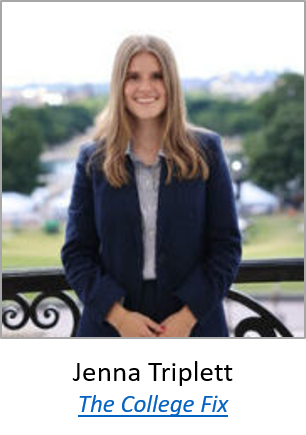Crazy College Courses Cost Parents, Students
Reports have proliferated in conservative circles and online for years about useless, goofy, and worse, destructive college courses that indoctrinate and propagandize students without providing a shred of academic value. As 2025 begins, the situation has only gotten worse, although there is hope that the new Trump Administration will reel in the radical progressive education agenda, as the president has vowed he will do.
While it’s well documented that Critical Race Theory (CRT) is solidly entrenched in higher education, including medical schools, there are courses now offered in colleges and universities that incorporate CRT with other far-left ideological notions that many view as not only divisive but ridiculous.
 A recent Newsweek article describes a new course at the University of Maryland called “Intro to Fat Studies: Fatness, Blackness, and Their Intersections,” which promises to examine “fatness as an area of human difference subject to privilege and discrimination.” The course defines “fat liberation” as a social justice issue, and promises to challenge “fatmisia,” a term invented to describe “prejudice against fat individuals.” But the fact that the course description asserts that it will “particularly highlight the relationship between fatness and Blackness” shows that it’s really about the persistent progressive crusade to create division and conflict based on race.
A recent Newsweek article describes a new course at the University of Maryland called “Intro to Fat Studies: Fatness, Blackness, and Their Intersections,” which promises to examine “fatness as an area of human difference subject to privilege and discrimination.” The course defines “fat liberation” as a social justice issue, and promises to challenge “fatmisia,” a term invented to describe “prejudice against fat individuals.” But the fact that the course description asserts that it will “particularly highlight the relationship between fatness and Blackness” shows that it’s really about the persistent progressive crusade to create division and conflict based on race.
This class is being offered by “Dr. Sydney F. Lewis, a senior lecturer at the Harriet Tubman Department of Women, Gender, and Sexuality Studies,” which should in and of itself warn parents of an impending waste of their money and their children’s time. The university characterizes Lewis’s work as striving “to blur the boundaries between the academy, art, and activism.”
Newsweek reports: “Lewis is the author of Love in the time of Trump, a 2020 essay which opens with the line, "the night of the 2016 election I sat in a bathtub and cried.” Observers assume she is similarly afflicted in January 2025.
The University of Maryland charges $420 per credit hour for in-state students and a hefty $1,645 per credit hour for out-of-state students, which means this three-credit hour course “would cost either $1,260 or $4,935.” University Professor Emeritus Dr. Richard Vatz told The National News Desk that the course’s relevance to preparing students for the job market “is probably pretty questionable” and called the subject matter “ludicrous.” He added: “I have to be honest with you, this is kind of a laughable, laughable subject.” Parents might argue that such imprudent propaganda is no laughing matter.
Useless in Utah
Not to be outdone, the University of Utah offers a course through its Gender Studies program entitled “Feminist Cannabis Studies.” Parents might logically wonder how this topic could be associated with feminism to the extent that it merits a college course. But as the saying goes, where there’s a will, there’s a way.
An article in the Washington Examiner explained that the course investigates “the history of the cannabis prohibition, legalization movement, and its political, social, cultural and practical intricacies.” The course description then cuts to the chase:
- Feminist Cannabis Studies also covers “Queer/Trans Activism and Racialized Histories.” It poses the question: “What does history tell us about the ways gender, race, sexuality, immigration and class have shaped our understanding of cannabis?” ... How has the image of cannabis functioned to maintain inequality based on such socially constructed categories? How have Communities of Color, LGBTQ+ and marginalized groups used and imagined cannabis in cultural, medicinal, and spiritual practices over time?
The course is taught by Dr. Magaly Ordoñez. a “Latinx Sexualities Postdoctoral Fellow” at the University of Utah. The Examiner reports that she “wrote a dissertation focused on ‘Chicanx and Latinx LGBTQ+ communities that have contributed to cannabis cultural and political histories.’” Ordoñez has also taken issue with what she called the exploitation of “immigrant women in California’s cannabis farming,” claiming that women in the industry are often “shunted into the role of trimming the cannabis flower bud and leaves.”
The University of Utah offers this absurd course through its “School for Cultural and Social Transformation,” or “Transform” for short, which consists of four “academic” fields: Ethnic Studies, Gender Studies, Disability Studies, and Pacific Islands Studies. These degree programs “explore race and racism, ethnicity, gender, sexuality and sexual identity, disability, health, and global diasporas.” For many parents and observers, Transform covers all the woke areas whereby kids entering college can be brainwashed, manipulated, propagandized, and yes, “transformed” into Marxist activists.
Racist course at Yale
A new course at once-prestigious Yale University pits students against each other by forcing them to “interrogate with brutal honesty the stakes that underwrite Black women’s relationships with White women.” As reported by The College Fix, this course is titled “No Time for Tears: Friendships between Black Women and White Women,” and aims to “determine whether these friendships can develop on ‘equal footing’ and be ‘unfettered by the trappings of quid pro quo transactions.’”
 The Fix writes that the list of readings for the course includes a report by TIME titled “How the Karen Meme Confronts History of White Womanhood.” As may be expected, this report paints white women in a negative and often racist light, using examples reported in the news about angry and combative white women creating havoc and propagating injustice for their victims, typically people of color.
The Fix writes that the list of readings for the course includes a report by TIME titled “How the Karen Meme Confronts History of White Womanhood.” As may be expected, this report paints white women in a negative and often racist light, using examples reported in the news about angry and combative white women creating havoc and propagating injustice for their victims, typically people of color.
The course is being taught by Professor Tasha Hawthorne, dean of Yale’s Pierson College. Hawthorne uses “contract grading,” a method that implies a “contract” between the professor and student whereby the student agrees to submit a certain number of assignments of a quality that would correspond to a letter grade, except that no letter grades are awarded. Fortunately, the course is only one credit hour, indicating a minimum amount of money invested and student time wasted.
The Fix author, Jenna Triplett, reported that African American political activist, Linda Lee Tarver, emailed to her comments criticizing the premise of the course as “absurd.” Tarver wrote: “The course makes presumptions that Black women and White women are not currently on equal emotional and social footing and may not, therefore, be able to develop sincere friendships. The push for diversity, equity, and inclusion in academia has perverted sane instruction.”
Tarver is a former Michigan civil rights commissioner, author, and a former board member of the group “Black Voices for Trump.” She is also an ambassador for Project 21, a “black leadership network” that promotes conservative values.
Declining college enrollment
Bizarre and useless courses have been a fixture in higher education for decades, as Phyllis Schlafly and the Phyllis Schlafly Eagles have long documented. But the leftward slant of the subject matter has grown more extreme, as exemplified by the courses described above. For many, there’s little wonder that college enrollment has fallen in recent years, a development bemoaned in a recent NPR article.
Not only is the population of graduating high school seniors in decline, but there is also “a decline in perception of the value of a college or university degree.” NPR reports that just “one in four Americans now says having a bachelor’s degree is extremely or very important to get a good job.” Just over 60 percent of high school seniors say they plan to go to college, as opposed to a high of 70 percent in 2016.
Falling enrollment has prompted many institutions of higher learning to shut their doors. The website Deep Thoughts on Higher Ed reports that while dozens of colleges have closed during the past decade, 30 have been shuttered in 2024, and the site projects that at least eight more will close in 2025. For most schools, financial difficulties are also to blame, and some have simply lost accreditation. Overall, the picture is not pretty, but a return to more robust curricula and less divisive, nonsensical courses could potentially help reverse the trend.
Want to be notified of new
Education Reporter content?
Your information will NOT be sold or shared and will ONLY be used to notify you of new content.
Click Here
Return to Home Page
